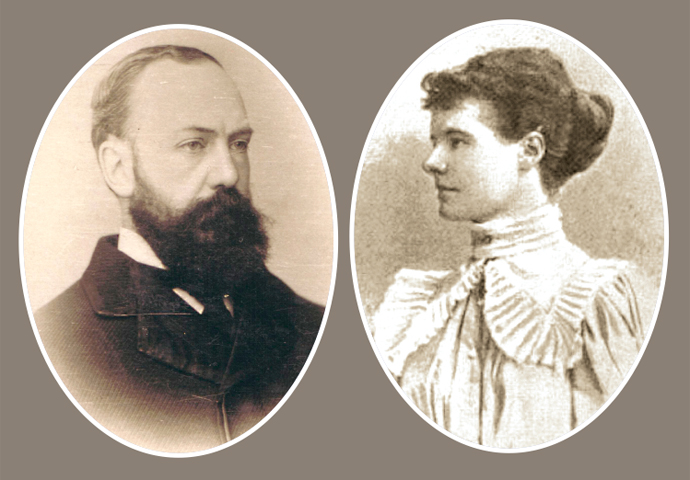Playing fast and louche
Camden Victorians: Neil Titley turns his attention to the unfairly disgraced MP Charles Dilke... who was possibly not that liberal
Thursday, 28th December 2023 — By Neil Titley

Sir Charles Dilke – as pictured on an Ogdens Cigarette card; and Virginia Mary Crawford, from The Sketch, January 15, 1896
TO most modern day Londoners the words “Warren Street” conjure up a quiet thoroughfare beside the eponymous tube station. In 1886, Londoners would have associated the name with something very different – namely that it had been the setting for one of the most titillating of Victorian sex scandals.
Elected to Parliament as a Liberal in 1868, Sir Charles Dilke (1843-1911) was a staunch radical who supported increasing the rights of working men, infuriated Queen Victoria by demanding that the monarchy pay income tax, and was seen as a possible successor to Gladstone.
After the early death of his first wife in 1874, Dilke courted Mrs Emilia Pattison, the wife of Mark Pattison, the Rector of Lincoln College, Oxford. The Pattison marriage had not been a happy one. George Eliot, who knew them both, reputedly based her Middlemarch characters Edward Casaubon and Dorothea Brooke on the couple.
With the death of her husband, Emilia married Dilke in 1885. Even at this early stage, his reputation for sexual misbehaviour caused doubts as to Emilia’s wisdom in the match, an observer claiming that “Dilke was known as a loose fish”.
In 1880 he was appointed under-secretary at the Foreign Office where part of his job was to oversee the reception of the new French Ambassador. The French had proposed a Marquis de Noailles for the job. To avoid possible scandal, Dilke had to veto the man because: “Queen Victoria has been told that Madame De Noailles before her marriage used to have four lovers, one for each season of the year, and that the Marquis de Noailles was only the summer one.”
Dilke was soon to have scandal enough in his own life. In February 1886, a divorce case began in London that was to destroy his career.
He was accused of debauching a young lady called Virginia Crawford, after previously seducing her mother, the wife of a fellow Liberal MP Thomas Smith.
Virginia, in answer to her husband’s demand: “Is it true that you have defiled my bed”, had sobbed out a confession claiming that Dilke had taught her “every French vice”. In fact, the bed in question had been at their love nest at 65 Warren Street.
Her husband Donald Crawford, also a Liberal MP, filed for divorce and the subsequent court case produced some sensational details.
Virginia claimed that in addition to seduction Dilke had introduced her to “threesome sex” by bringing his maid Fanny into bed with them.
The journalist Frank Harris was highly amused by the additional testimony of a chambermaid that often three pillows were wanted for Dilke’s bed.
Dilke was not called to give evidence and the case against him as co-respondent was dismissed. Crawford obtained his divorce solely on the grounds of his wife’s confessions. This produced the odd judicial result that Virginia was guilty of adultery with Dilke, but that Dilke was exonerated of adultery with Virginia.
Although legally safe, his reputation was in tatters and his bedroom antics became the subject of many risqué music-hall songs. The scandal roused a fierce feminist backlash against him despite his strong support of women’s suffrage.
By the 1890s though, the tide turned. Dilke always protested his innocence and over the next 10 years much evidence came to light that appeared to support his claims.
A later inquiry cast doubt on the truthfulness of Virginia’s evidence. Her description of their alleged love nest in Warren Street was full of inaccuracies and it has been speculated that she may have been attempting to distract attention from an earlier affair with a Captain Forster.
Previously, the main assumption had been that a genteel young girl like Virginia would have been very unlikely to have invented such sophisticated details as “threesome” sex. It emerged, however, that she and her two sisters, Mrs Harrison and Mrs Ashton Dilke (to add to the brew, Dilke’s brother’s wife), had been involved in similar activities with other men prior to the divorce case.
It had long been the practice of the sisters to visit a brothel at 9 Hill Street, W1, for assignations with men.
Captain Forster, Virginia’s other admitted lover, far from seducing her, had been introduced to the brothel by Virginia herself.
Also, Dilke’s detectives discovered letters implying that the sisters were well known for their affairs with various medical students at St George’s Hospital at Hyde Park Corner (now the Lanesborough Hotel) and had indulged in threesomes on many occasions.
Soon it was suspected in political circles that the case had been a plot to bring about Dilke’s downfall. The likely culprit was Dilke’s friend Joseph Chamberlain (who had been the best man at his wedding to Emilia). As the editor Henry Labouchere put it: “If Chamberlain were alone on a desert island, he would intrigue against himself.”
By 1900 the American observer Gertrude Atherton reported that it was generally believed that Dilke had been the victim of a conspiracy.
In spite of the new evidence and although he later became a locally popular MP for the Forest of Dean, Dilke’s career as an effective politician was over. Warren Street was allowed to resume its tranquil respectability.
• Adapted from Neil Titley’s book The Oscar Wilde World of Gossip. For information go to www.wildetheatre.co.uk
New deluxe and revised American edition: st uniexna.com